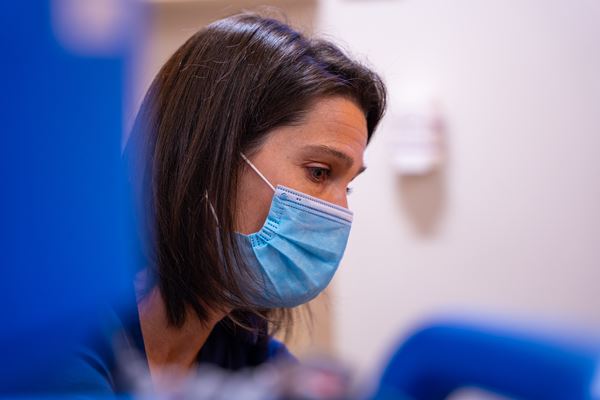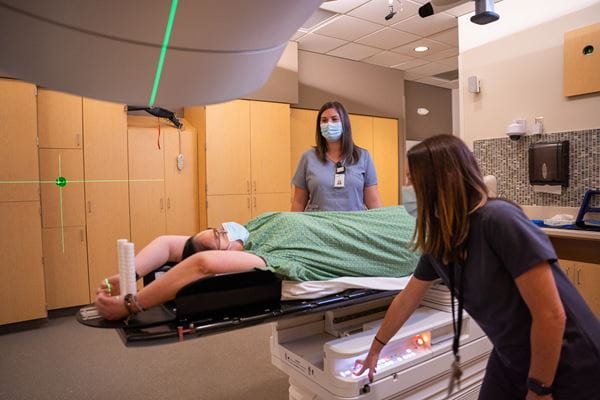
AHCI offers a supportive screening experience for mammography and more
Breast cancer is a leading cause of illness and death in women. Each year in the U.S., almost 290,000 women are newly diagnosed with invasive breast cancer. More than 40,000 women die annually from the disease.
Early breast cancer detection saves lives. Patients have a 99% 5-year survival rate when cancer is diagnosed at the localized stage. Prompt diagnosis and treatment also has other benefits. It means that women need less extensive surgeries, fewer mastectomies and less frequent or aggressive chemotherapy.
Allina Health Cancer Institute’s (AHCI) breast cancer services include advanced mammography along with other screening technologies. Our specialty breast clinics are dedicated to managing care for high-risk patients who need frequent testing and follow-up.
How AHCI Screens for Breast Cancer

AHCI recommends baseline breast risk assessments for all female patients beginning at age 25. A patient’s primary care physician typically performs the assessment. We recommend using a screening tool such as the National Cancer Institute’s Breast Cancer Risk Assessment Tool.
We also recommend that women have an annual mammogram starting at age 40 and continue having them as long as they are healthy.
AHCI’s breast centers use advanced screening and diagnostic technologies. Our resources include:
- 3D mammography (tomosynthesis): We use this leading-edge technology for routine screening. Three-dimensional mammograms detect more breast cancers than older two-dimensional mammograms. Additionally, three-dimensional mammograms reduce the number of times women are recalled for abnormal screening mammograms.
- Ultrasound: Each of our diagnostic breast imaging centers have ultrasound equipment, which complements the use of mammograms.
- Breast MRI: We recommend additional testing with a breast MRI for women who are at high risk for future breast cancer. We describe those high-risk criteria in the next section. In addition, we use breast MRI for those patients who have either a new diagnosis or a history of breast cancer.
- Brevera® stereotactic breast biopsy device: Small calcium deposits in the breast are early warning signs of cancer. The Brevera biopsy device uses images during a biopsy to sample those deposits. This efficient technology reduces the number of required needle samples compared to older stereotactic breast biopsy devices.
How AHCI’s Specialty Breast Clinics Support High-Risk Patients
At AHCI’s breast clinics, we manage patients’ complex breast-related conditions. These clinics are ideal resources for high-risk patients who need frequent breast evaluations, diagnostic tests and follow-up. Each of AHCI’s four breast center locations has a breast clinic.
In our breast clinics, we see patients with:
- High risk of developing breast cancer: We accept any patient with a 20% or higher risk to develop invasive breast cancer when measured by breast cancer risk assessment tools, such as the Gail mode or the Tyler-Cusick model. Many of these patients will have a significant family history of breast cancer or genetic mutations like BRCA-1 or BRCA-2.
- History of breast cancer: We see women who have had breast cancer and need frequent follow-up care.
- Special breast-related conditions: We also treat patients who have difficult-to-manage conditions, like persistent breast pain or uncontrollable nipple discharge, in our breast clinics.
Who Are AHCI’s Experts in Breast Cancer Screening?

Our team is dedicated to excellence in breast imaging. We are proud of our expertise, continuing education and quality standards.
Credentials
AHCI’s professionals are highly credentialed and well-trained experts.
- Radiologists: All of AHCI’s radiologists have a dedicated breast imaging fellowship or additional focused training in breast imaging.
- Mammography technologists: Our breast center technologists must be registered in mammography with the American Registry of Radiologic Technologists.
Ongoing training
Each of our professionals completes the continuing education required to maintain their credentials and stay compliant with MQSA regulations. We also provide internal training forums such as:
- Breast tumor board meetings: We have weekly multimodality meetings to review breast cancer cases and formulate treatment plans. Representatives from our surgery, oncology, pathology, radiology, radiation oncology, genetics and nursing departments attend these meetings.
- Radiology case study discussions: Our radiologists gather for case study discussions each quarter. We review clinical presentations and take time to learn from challenging, interesting and rare cases of breast cancer.
Radiology standards
We are committed to best practices in diagnosing and treating breast cancers.
AHCI’s breast centers strictly adhere to the Mammography Quality Standards Act (MQSA), which is enforced by the FDA. Our team follows protocols that meet or exceed MQSA’s standards.
Each of our breast imaging medical directors participate in our breast Safety and Quality Program Committees. These committees standardize workflows and policies and maintain the highest standards for our patients’ safety and experience.
AHCI’s Timelines for Breast Cancer Appointments and Reporting Results
AHCI schedules patient appointments and reports test results, both to patients and referring providers, in a time-efficient manner.
Timelines for appointments
Our typical appointment wait times are:
- Imaging tests for abnormal physical findings, such a breast lump: Within 1 to 2 days
- Visit with an oncologist and surgeon for a new breast cancer diagnosis: Within 1 week
- Routine screening mammograms: Within 2 weeks (somewhat longer in the fall and toward the end of the year due to Breast Cancer Awareness month in October)
Timelines for reporting imaging results
We give patients their test results on a timely basis to reduce the stress of waiting.
We give patients with symptoms or abnormal screening mammogram findings their results before they leave the breast center. For routine screening mammograms, we report the results within two business days. However, we often read mammograms the same day or within one business day. All patients who have a mammogram receive a letter with the results through their Allina Health account (MyChart) or USPS mail.
AHCI’s Breast Centers Improve Patients’ Mammography Experience
At AHCI, we emphasize our host culture, meaning that we meet, greet and treat patients as guests. We use this culture to help our patients have a positive breast screening experience, including mammography.
We introduce ourselves to patients and to other team members using our first names. We update patients about how long it will be until they are called for their test.
We have designed our breast centers so that they are relaxing and comfortable. Our centers include the following aesthetic enhancements:
- Calming music in our waiting rooms
- Plush patient robes like those used at spas or hotels
- Interiors with appealing colors and soothing nature scenes
- Lighting that provides a bright, open and airy look
- Televisions in some exam rooms that play soothing nature scenes
How AHCI Works With Referring Providers
We communicate closely with referring providers and send regular updates about the patient’s status.
Our team sends imaging results as soon as they are available. For breast clinic patients, we send regular reports to referring providers about patient discussions and the treatment plan.
If the provider is within Allina Health, they can access the updates through our electronic medical records system. If the provider is outside of Allina Health, we send the report through our automated fax system.
How to Refer a Patient to AHCI
We welcome the opportunity to work with referring physicians, both within and outside of Allina Health.
Providers from within Allina Health can send referrals through Epic, our electronic medical records system. Providers outside of Allina Health can refer patients by calling our nearest breast center:
- AHCI – Piper Breast Center – Coon Rapids: 763-236-0818
- AHCI – Piper Breast Center – Plymouth: 763-577-7676
- AHCI – Piper Breast Center – Minneapolis: 612-863-3150
- AHCI – Piper Breast Center – St. Paul: 651-241-8300